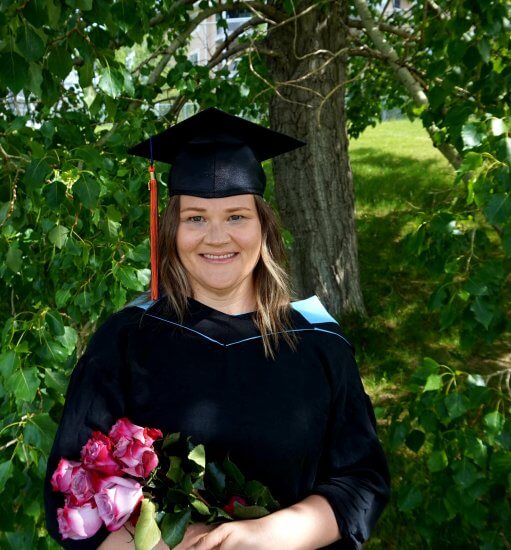Convocation Countdown: Day 20—Gabrielle Heselton
Gabrielle Heselton has completed a Master of Counselling degree at Athabasca University (AU), but her educational journey isn’t finished yet.
The 2021 Governor General’s Academic Gold Medal Winner is already looking at ways to expand on her research, which examines how to support the mental health of kids and adults on the autism spectrum, in a PhD program next fall.
“I’d like to continue working with the autism community in designing studies to meet their needs and improve their circumstances,” she said.
From teacher to learner

Heselton has extensive educational and on-the-job experience as a teacher—including a master of arts in teaching and a master of education in special education—due in part to her own love of school she developed as a student.
In her time on the job, she always appreciated seeing what was happening in the research and how she could apply it to her students. For most of her career, she worked with students with diverse learning needs, and most recently she worked exclusively with students on the autism spectrum.
She said she realized that the students she was working with might be struggling with underlying mental health issues that were being overlooked or misunderstood.
“I really wanted to understand more about how to support the mental health of kids and adolescents on the autism spectrum, because I felt that was a really big gap in the services we were able to provide in the classroom,” Heselton said.
She opted for a career change in 2017 and chose to pursue counselling at AU, partly because she would be able to do a thesis as part of the work, and look further into questions about the impact of early childhood traumas and attachment disruption on the mental health of children and adolescents on the autism spectrum.
“I wanted to know what kind of protective factors these kids had in their lives, that maybe supported them in overcoming those experiences,” she said.
In the course of her program, she has submitted three articles to peer-reviewed journals, and has given seven peer-reviewed presentations about her research. This has been funded in part by several awards and grants from both within AU and from outside agencies.
Overcoming challenges
This is not to say that it was always easy. Heselton said she struggled somewhat with the lack of face-to-face instruction in the online environment, something that was made even more challenging being a student with a visual impairment.
“I had to find a way to accommodate for my disability that I really didn’t have to do in previous programs,” she said. “The Accessibility Services department at AU was so incredible. I cannot say enough about how supportive and accessible they were. Any time I needed anything, I would just send an email and they would get back to me.”
She said it was not just the support she received from Accessibility Services that helped her to achieve what she has. She credits much of her success to the Faculty of Health Disciplines in general, and the Graduate Centre for Applied Psychology in particular, for having such high expectations of learners.
“They set a high bar for academics and for research,” Heselton said. “The quality of the research we’re doing is because of the support we’re getting from the faculty and the program.”
Although she already has her sights set on a doctoral program, in the shorter term she’s looking forward to the opportunity to celebrate Convocation—virtually with her classmates and supervisor, and in-person with her partner. After that, though, she has little doubt she will continue to pursue a career in research.
“For me, being involved in research and academia is one way that I can advocate and be involved in improving the lives of people with disabilities and those on the autism spectrum, in a way that uses my passion.”